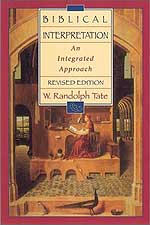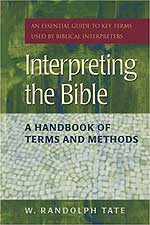I’m teaching an undergraduate course on the book of Genesis this semester. One of the first assignments I require students to complete is to read through the book of Genesis (preferably in one sitting) and write one or two brief yet descriptive sentences for each chapter of the book. I have a number of different reasons behind getting students to do this assignment, perhaps my biggest reason is to get students into the biblical text right at the beginning of the semester. This exercise also provides students with an outline of the book which they can use as a study aid throughout the semester.
While I always encourage creativity, most of the assignments are well done, but pretty straightforward. That being said, a number of years ago when I was teaching a course at Wycliffe College in Toronto, one of my students, Joseph Walker, went far beyond any expectations and wrote his chapter summaries as an extended limerick. Joseph is now the rector at St Timothy’s Anglican Church here in Edmonton (he kindly gave me permission to share the limrick with you). Enjoy.
1 The God who created the world,
2 on this planet humanity hurled,
3 with a snake in the grass,
4 to tempt family en masse,
5 Adam’s generations unfurled.
6 They were wicked (no need to convince!),
7 God said “Get in the ark, I’ll evince
8 with a great Holy Wash,
9 my covenant, gosh
10 and three sons will come out in the rinse.
11 They could not reach heaven by skill
12 so God thought “Someday I’ll fulfill
13 a promise of lands
14 where Melchizedek stands
15 if Abe keeps my covenant still.�
16 So Ishmael resulted from quibbling
17 but the promise of “heir� kept on nibbling.
18 After Sodom’s destruction,
19 and old Lot’s instruction,
20 tell us, is she or ain’t she your sibling?
21 Finally Sarah and Abe had a son,
22 (by sacrifice almost undone!)
23 and then Sarah died
24 and young Isaac applied
25 to the birthing of two, not just one!
26 Now Isaac, his father did imitate,
27 and a strange way of blessing initiate,
28 on Jake’s dreamy head,
29 who then thought instead,
30 of marriage (and family) to consummate.
31 At Laban’s striped flock he did point,
32 his new name put him all out of joint,
33 his bro’ burst his bubble,
34 his kids got in trouble,
35 and all their 12 names we have loint.*
36 Esau’s descendants were listed by name,
37 Joe’s brothers did wrong, to their shame,
38 what with Judah’s romances,
39 and Pot’s wife’s advances,
40 some hard luck to Joseph soon came.
41 Yet Joseph was favored with power,
42 and his brothers before him did cower,
43 though he tricked like a thief,
44 to his brothers’ relief,
45 his father with presents he’d shower.
46 So Israel left his vicinity,
47 in Egypt they were blessed by Divinity
48 and the Patriarchs passed
49 on their blessings, at last
50 and the Covenant went on to infinity
*With apologies to the Brooklyn / east side N.Y. accent
If you liked this sample of his writing, you should check out Joseph’s blog, Felix Hominum.

 In the past when I taught the introductory hermeneutics course at Taylor, I used
In the past when I taught the introductory hermeneutics course at Taylor, I used 